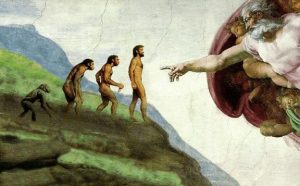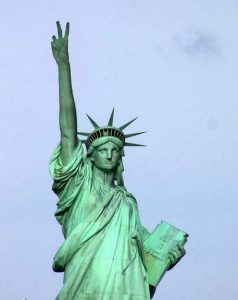The Unverifiable Truth-Claim! | Mid-Year Special 2016 (with video)
"The Unverifiable Truth-claim", recorded at BASR 2016, hosted by David Robertson, and featuring Christopher Cotter, Katie Aston, Jonathan Tuckett, and Krittika Bhattacharjee! Plus a special appearance by RSP Managing Editor, Thomas Coleman! If Carole Cusack isn't playing, who will win? How many times will Jonathan accidentally swear? In-jokes galore!
Watch the video episode here:
As our main audio setup failed us, we have used the backup, which is a little "roomier" than we would like. But these are one-off events, a thank you to our fans and sponsors, so we hope you enjoy anyway. Maybe next year we can organise a US version at the AAR. Although remember when "Whose Line is it Anyway" went to the US? It wasn't good.
If this gets you in the festive mood, you might want to check out our back catalogue of festive specials:
- 2012 – Only 60 Seconds!
- 2013 – Nul Point!
- 2014 – Masterbrain!
- 2015 – Fourteen to One!
Comedy, Comedians, and Church: The Interplay between Religion and Humor
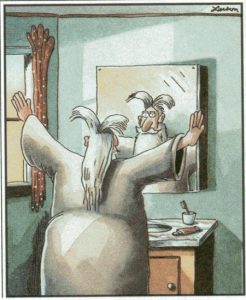 Beyond the irony of the Church of the Flying Spaghetti Monster, the Tony-Award winning musical, the Book of Mormon, or the use of a funny meme or two in the classroom, religion and humour are perhaps not two concepts one often considers together. However, the interplay between religion and humour comes in many forms; comedy films, stand-up comedy, musicals, satire, and kitsch products are just a few platforms in which religion and humor come together. In this RSP interview from our friends in Australia, Dr Elisha McIntyre discusses her research into religion and humour, particularly looking at comedic work The Church of Jesus Christ of Latter Day Saints as well as a broad range of evangelical comedians. McIntyre discusses the use of religious comedy as a point of entertainment as well as an identity solidifier, evangelical tool, and preaching format within Christianity.
Beyond the irony of the Church of the Flying Spaghetti Monster, the Tony-Award winning musical, the Book of Mormon, or the use of a funny meme or two in the classroom, religion and humour are perhaps not two concepts one often considers together. However, the interplay between religion and humour comes in many forms; comedy films, stand-up comedy, musicals, satire, and kitsch products are just a few platforms in which religion and humor come together. In this RSP interview from our friends in Australia, Dr Elisha McIntyre discusses her research into religion and humour, particularly looking at comedic work The Church of Jesus Christ of Latter Day Saints as well as a broad range of evangelical comedians. McIntyre discusses the use of religious comedy as a point of entertainment as well as an identity solidifier, evangelical tool, and preaching format within Christianity.
You can download this interview, and subscribe to receive our weekly podcast, on iTunes. If you enjoyed it, please take a moment to rate us . And remember, you can use our Amazon.co.uk, Amazon.com, or Amazon.ca links to support us at no additional cost when buying academic texts, whoopee cushions, hand buzzers, and other comedic classics.
Religion, Spirituality, and Addiction Recovery
What is the relationship between 'religion', 'spirituality', 'addiction' and 'addiction recovery'? What are we meaning by 'addiction'? Is it socially constructed? Why are we even talking about a relationship between these concepts? Can religion be conceptualized as an addiction? how might a specifically Religious Studies approach help us to productively engage with this particularly sensitive area? And, as ever, how might we go about conducting such research? These are just a few of the questions discussed in today's podcast, where Chris speaks with Dr Wendy Dossett of the University of Chester, UK.
Be sure to take a peek at some of Wendy's other scholarship, like the book Narrative and Reflexivity in the Study of Religion.
You can download this interview, and subscribe to receive our weekly podcast, on iTunes. If you enjoyed it, please take a moment to rate us . And remember, you can use our Amazon.co.uk, Amazon.com, or Amazon.ca links to support us at no additional cost when buying academic texts, flowers, tea tree oil, and more.
Religion, Science and Evolutionary Theory
Science and evolution in Muslim societies is a complicated topic. Among the public, what does evolution mean? Whats does evolution stand for? Is there a 'Muslim view' on evolution? In this podcast, Stephen Jones interviews Salman Hameed about recent research on Muslim perceptions of science and evolution.
Study of Religion in Peru
 Peru’s religious inheritance has been the subject of inquiry by scholars since the first decade of the twentieth century (Ortmann, 2002). In this RSP interview, we are joined by professor Dorothea Ortmann from the University of Rostock, to discuss the foundations of the study of religion in this country. She first states the major differences between the confessional studies or studies oriented to theological or pastoral matters, and the social scientific study of religious phenomena (Ortmann, 2004). She then follows the conversation by giving some background history of the most notable works from the first attempts at doing research on the sciences of religion. Particularly important are the works of Tello (1943), Larco Hoyle (1946), Valcárcel (2009), and Carrión (2005).
Peru’s religious inheritance has been the subject of inquiry by scholars since the first decade of the twentieth century (Ortmann, 2002). In this RSP interview, we are joined by professor Dorothea Ortmann from the University of Rostock, to discuss the foundations of the study of religion in this country. She first states the major differences between the confessional studies or studies oriented to theological or pastoral matters, and the social scientific study of religious phenomena (Ortmann, 2004). She then follows the conversation by giving some background history of the most notable works from the first attempts at doing research on the sciences of religion. Particularly important are the works of Tello (1943), Larco Hoyle (1946), Valcárcel (2009), and Carrión (2005).
In what remains of the interview, professor Ortmann discusses the public benefits of studying religion. It ends with an interesting discussion about the current institutional and theoretical situations of the field in Peru, taking into account new tendencies coming from Europe and North America (Xygalatas, 2015).
You can download this interview, and subscribe to receive our weekly podcast, on iTunes. If you enjoyed it, please take a moment to rate us. And remember, you can use our Amazon.co.uk, Amazon.com, or Amazon.ca links to support us at no additional cost when buying academic texts, drink coasters, T.V. Dinners, and more.
References
-Carrión, R. (2005). Culto al agua en el antiguo Perú. Lima: Instituto Nacional de Cultura.
-Ortmann, D. (2002). Ciencias de la religión en el Perú. Lima: Universidad Nacional Mayor de San Marcos.
-Ortmann, D. (2004). "Fundamentos de las Ciencias de la Religión". In Ortmann, Dorothea (compiler). Anuario de Ciencias de La Religión: Las Religiones En El Perú de Hoy. Lima: Universidad Nacional Mayor de San Marcos, pp. 13–29.
-Larco Hoyle, R. (1946). A culture sequence of the north coast of Perú. Washington: Smithsonian Institution. Accesed on: August 15, 2016.
http://www.museolarco.org/listapublicaciones/a-culture-sequence-for-the-north-coast-of-peru/
-Tello, J. (1943). “Sobre el descubrimiento de la cultura Chavín en el Perú”. Letras. Lima, No. 26, pp. 226-373.
-Valcárcel, L. (2011). Machu Picchu. Lima: Fondo de Cultura Económica
-Xygalatas, Dimitris (2015). IACSR year in review: 2015. Georgia. Accessed on: January 15 of 2016.
AI and Religion: An Initial Conversation
This roundtable, in association with the Faraday Institute for Science and Religion, considers the impact of recent technological advances in Artificial Intelligence (AI) and robotics on religion, religious conceptions of the world, and the human. It draws attention to how such advances push religion beyond how it has been commonly defined and considered.
 In March 2016 ‘AlphaGo’, a Google/Deepmind programme, defeated an international champion at the Chinese game ‘Go’ in a five game match. This victory was, by current understandings of AI, a vast leap forward towards a future that could contain human-like technological entities, technology-like humans, and embodied machines. As corporations like Google invest heavily in technological and theoretical developments leading towards further, effective advances – a new ‘AI Summer’ - we can also see that hopes, and fears, about what AI and robotics will bring humanity are gaining pace, leading to new speculations and expectations, even amidst those who would position themselves as non-religious.
In March 2016 ‘AlphaGo’, a Google/Deepmind programme, defeated an international champion at the Chinese game ‘Go’ in a five game match. This victory was, by current understandings of AI, a vast leap forward towards a future that could contain human-like technological entities, technology-like humans, and embodied machines. As corporations like Google invest heavily in technological and theoretical developments leading towards further, effective advances – a new ‘AI Summer’ - we can also see that hopes, and fears, about what AI and robotics will bring humanity are gaining pace, leading to new speculations and expectations, even amidst those who would position themselves as non-religious.
Speculations include Transhumanist and Singularitarian teleological and eschatological schemes, assumptions about the theistic inclinations of thinking machines, the impact of the non-human on our conception of the uniqueness of human life and consciousness, and the moral boundary work of secular technologists in relation to their construct, ‘religion’. New religious impulses in the face of advancing technology have been largely ignored by the institutions founded to consider the philosophical, ethical and societal meanings of AI and robotics. This roundtable is an initial conversation on this topic, with the intention for further discussion and publications.
You can download this interview, and subscribe to receive our weekly podcast, on iTunes. If you enjoyed it, please take a moment to rate us. And remember, you can use our Amazon.co.uk, Amazon.com, or Amazon.ca links to support us at no additional cost when buying academic texts, tin foil hats, Jeff Goldblum custom water proof shower curtains, and more.
Religious Freedom in America: Theoretical Considerations
Religious freedom is an inherently good thing, right? It’s a cherished idea that is easy for state governments to enact, no? In this interview, Finbarr Curtis questions both of these assertions. In The Production of American Religious Freedom, Curtis argues that religious freedom is a fluent and malleable concept that people deploy for various and competing reasons. Curtis uses several case studies to illustrate how the rhetoric of religious freedom has no coherent logic. This discussion has both legal and political implications, as it concludes that one of modernity’s most important concepts—religious freedom—is both unobtainable and undesirable.
Yoga in Museums
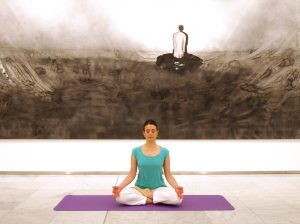
Yoga, in its modern form, should be of great interest to scholars of religion. While it certainly has roots in Vedic culture, the vast majority of Western practitioners do not see it as "religious", but rather to do with health or "well-being". Yoga's status as religious has been in court, but nevertheless it continues to be practised in business, schools and, as Bruce Sullivan tells us, museums.
You can download this interview, and subscribe to receive our weekly podcast, on iTunes. If you enjoyed it, please take a moment to rate us. And remember, you can use our Amazon.co.uk, Amazon.com, or Amazon.ca links to support us at no additional cost when buying academic texts, Gruyère cheese, and more.
Religion, Gender, and Gender Violence
 Religion and gender violence is, an undesirable yet critical area of research in the field of religious studies. Violence inflicted against people of all gender and sexual orientations comes in numerous forms, and is something to which many faiths are connected in some way. In this podcast Dr Caroline Blyth discusses her research on 'theologies of rape' and gender violence as enacted against males and masculinity, particularly within the Christian Church. Blyth also discusses her upcoming edited series Rape Culture, Gender Violence and Religion (edited with Dr Emily Colgan and Dr Katie Edwards). In latter part of the interview, Blythe is joined by a contributor to the series who discusses his experience in the LGBTI community and how that has impacted his academic work in the volume. The two also discuss their involvement with Hidden Perspectives at the University of Auckland, a project that provides a platform for LGBTI student voices within the Faculty of Arts teaching and research community.
Religion and gender violence is, an undesirable yet critical area of research in the field of religious studies. Violence inflicted against people of all gender and sexual orientations comes in numerous forms, and is something to which many faiths are connected in some way. In this podcast Dr Caroline Blyth discusses her research on 'theologies of rape' and gender violence as enacted against males and masculinity, particularly within the Christian Church. Blyth also discusses her upcoming edited series Rape Culture, Gender Violence and Religion (edited with Dr Emily Colgan and Dr Katie Edwards). In latter part of the interview, Blythe is joined by a contributor to the series who discusses his experience in the LGBTI community and how that has impacted his academic work in the volume. The two also discuss their involvement with Hidden Perspectives at the University of Auckland, a project that provides a platform for LGBTI student voices within the Faculty of Arts teaching and research community.
You can download this interview, and subscribe to receive our weekly podcast, on iTunes. If you enjoyed it, please take a moment to rate us. And remember, you can use our Amazon.co.uk, Amazon.com, or Amazon.ca links to support us at no additional cost when buying academic texts, Everlasting Gobstoppers, and more.
South American church-state relations
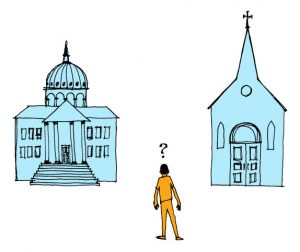 Politics and social institutions are inseparable. Whether we take a look at small-scale or complex societies, we can find that politics is involved with economics, kinship with hierarchy, and of course, religion with the state. The relationship between the last two has been shaped by numerous processes throughout human history; but, if we place our attention in the history of the western world, we can identify a turning point, one that started with the first waves of enlightened thought (eighteenth century), continuing with the posterior massive drop-out of catholic religiosity, and culminating with the total separation of religion and the state. In this podcast, Sidney Castillo interviews professor Marco Huaco Palomino as he addresses the nuances of secularity in several Latin American countries.
Politics and social institutions are inseparable. Whether we take a look at small-scale or complex societies, we can find that politics is involved with economics, kinship with hierarchy, and of course, religion with the state. The relationship between the last two has been shaped by numerous processes throughout human history; but, if we place our attention in the history of the western world, we can identify a turning point, one that started with the first waves of enlightened thought (eighteenth century), continuing with the posterior massive drop-out of catholic religiosity, and culminating with the total separation of religion and the state. In this podcast, Sidney Castillo interviews professor Marco Huaco Palomino as he addresses the nuances of secularity in several Latin American countries.
You can download this interview, and subscribe to receive our weekly podcast, on iTunes. If you enjoyed it, please take a moment to rate us. And remember, you can use our Amazon.co.uk, Amazon.com, or Amazon.ca links to support us at no additional cost when buying academic texts, Richard Dawkins memorabilia, and more.

